Multipurpose Cash Assistance
Multipurpose Cash (MPC) are unrestricted cash transfers that people affected by crises can use to cover their basic needs. By its nature, MPC is the assistance modality which offers people a maximum degree of choice, flexibility and dignity. There is also growing evidence that it is more cost-efficient and cost-effective to meet multiple needs.
But this requires new ways of collaborating between humanitarian actors, at all stages of the program cycle, and across sectors. While solid tools exist to support collaboration, they have not been widely adopted and MPC is still used in an ad-hoc way. Challenges remain to be addressed if we are to successfully fit MPC into the humanitarian system.
Featured content

Multipurpose cash outcome indicators and guidance
Guidelines and Tools
The indicators in this document, developed by the Grand Bargain Cash Workstream, focus on the primary objectives of humanitarian Multipurpose Cash Assistance (MPC), and the outcomes to which MPC can most strongly contribute in a given context.
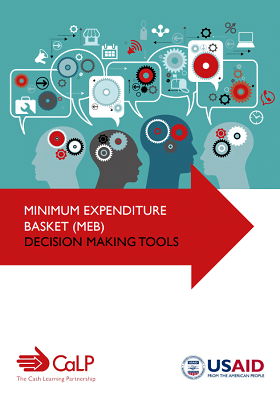
Minimum Expenditure Basket (MEB) Decision Making Tools
Guidelines and Tools
Update: This publication was revised in 2022. Please read the revised publication here.
The purpose of this tipsheet is to accompany practitioners and decision makers through key stages in the process of calculating an MEB to: (a)
identify what is the most appropriate path to take in relation to their
particular context, identified objective, existing capacities and available
resources; and...
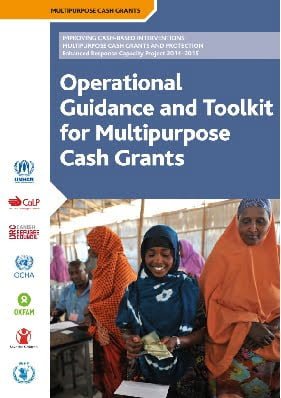
Operational Guidance and Toolkit for Multipurpose Cash Grants
Guidelines and Tools
This operational guidance and toolkit brings together worldwide expertise on cash-based interventions (CBIs). It provides comprehensive and practical guidance for humanitarian actors to assess the feasibility, conceptualise the design and structure the implementation of MPGs. The guidance focuses on MPGs whose primary objective is to meet basic needs as defined by affected people...

Definition of Minimum Expenditure Baskets (MEB) in West Africa
Report
Throughout 2017, five countries in West Africa have worked collectively to define minimum expenditure baskets, in order to better capture the contribution that humanitarian assistance is making to address the basic needs of affected populations, and improve the impact of assistance. This heavy process raises technical and coordination challenges. The CALP Network, with support from USAID /...
Thematic lead
Latest
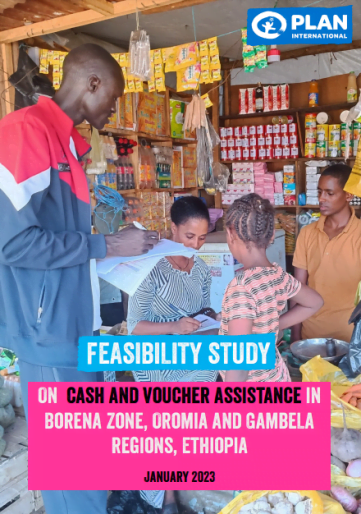
Feasibility study on cash and voucher assistance in Borena zone, Oromia and Gambela regions, Ethiopia
Case Study
The report indicates the feasibility of cash and voucher assistance in Borena, Oromia and Gambela regions of Ethiopia conducted in December 2022.
The following key determinants, were used to arrive at a conclusion if the CVA modality will be feasible to achieve the set outcomes to provide integrated...
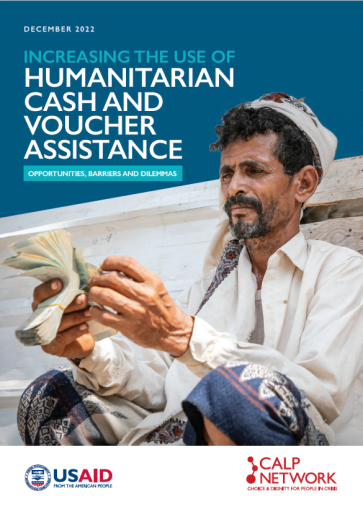
Increasing the Use of Humanitarian Cash and Voucher Assistance: Opportunities, Barriers and Dilemmas
Report
Through in-depth analysis of the latest data and careful modelling this study maps the current scale of CVA, and unpacks the opportunities and challenges involved towards it fully reaching its potential.
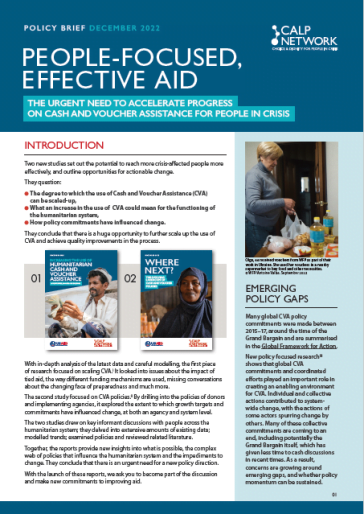
People-focused, effective aid: The urgent need to accelerate progress on cash and voucher assistance for people in crisis
Policy paper
Setting out a clear case for action, this Policy Brief outlines the latest evidence and information around how CVA is being used, and if it is meeting its potential to support people in crisis. It urges us to define and commit to a new collective vision for the development of CVA.
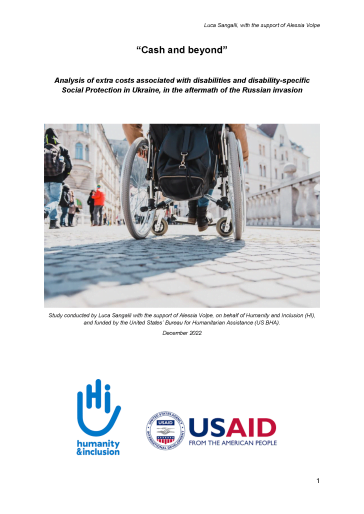
Cash and beyond – Analysis of extra costs associated with disabilities and disability-specific social protection in Ukraine, in the aftermath of the Russian invasion
Report
Following the escalation of the conflict in Ukraine in February 2022 and the consequent humanitarian crisis, the country has experienced active fighting and massive displacement, both within and outside its borders. Persons with disabilities and older persons have been facing particularly harsh effects,...
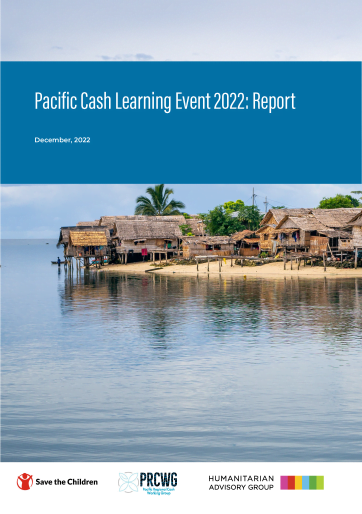
Pacific cash learning event 2022: Report
Report
The Pacific Cash Learning Event was held during an important time for the region. The Pacific is highly vulnerable to disasters, which are becoming increasingly frequent and intense as a result of climate change. These disasters threaten health, food and water systems and economic security, while the...
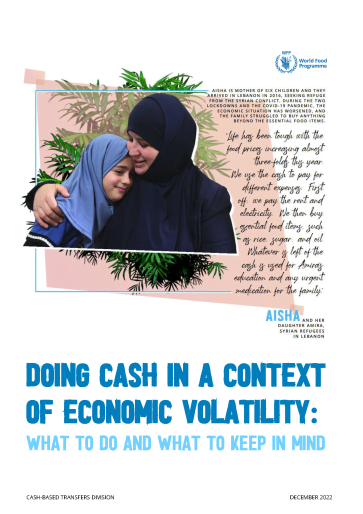
Doing Cash in a context of economic volatility: What to do and what to keep in mind
Guidelines and Tools
This interim WFP guidance was issued in 2022 to provide support to cash operations in contexts of economic volatility, be it when there is inflation, depreciation or currency volatility, parallel exchange rates, liquidity issues and changes in financial regulation, among others.
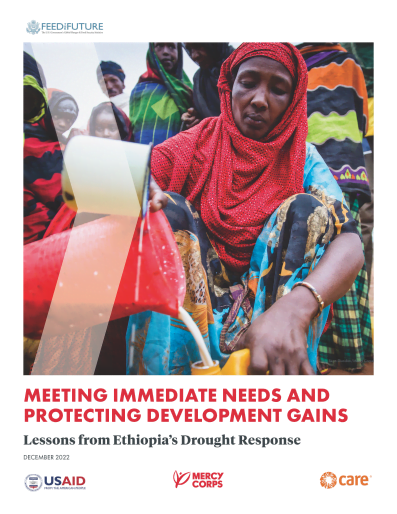
Meeting immediate needs and protecting development gains: Lessons from Ethiopia’s drought response
Case Study
From April to October 2022, Mercy Corps’ Resilience in Pastoral Areas, North (RIPA-North) program provided a humanitarian drought response in the Somali Region of Ethiopia funded by the activation of a crisis modifier. This drought response was designed to complement and build on the Market Systems...

Calculating the Minimum Expenditure Basket: A Guide to Best Practice
Guidelines and Tools
If you play a role in developing or revising MEB, then this tool is for you. This guidance is the revised and restructured version of the 2020 Minimum Expenditure Basket (MEB) Decision Making Tool. The MEB has emerged as a key tool in humanitarian action in situations where cash and voucher assistance...
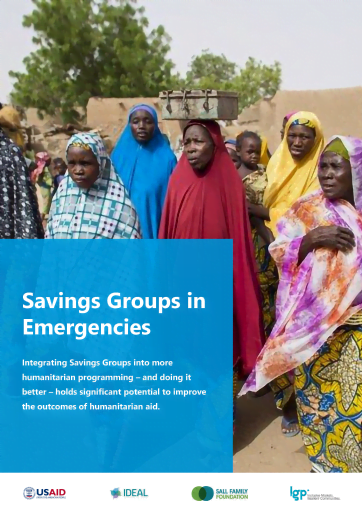
Savings Groups in Emergencies Learning Brief
Guidelines and Tools
We know that savings groups work – and that they are powerful. But, in emergencies, we must revisit some of our approaches and assumptions. Integrating savings groups into more humanitarian programming – and doing it better – holds significant potential to improve the outcomes of humanitarian aid....
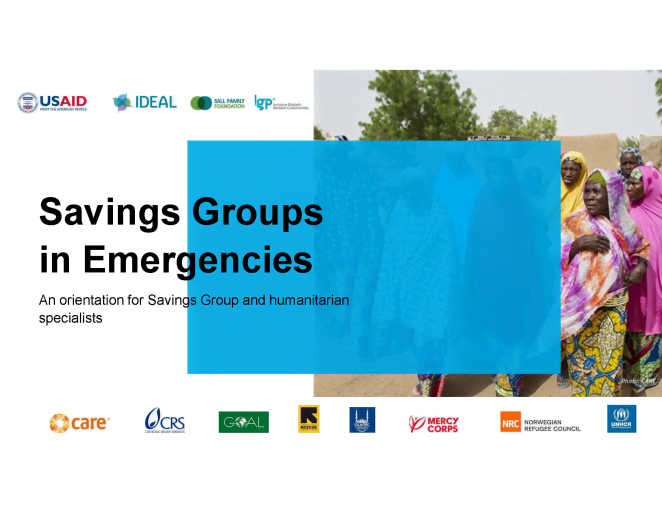
Savings Groups in Emergencies Training Slide Deck
Guidelines and Tools
This Training Slide deck provides actionable guidance to organizations to promote or work with Savings Groups in emergency settings. We know that Savings Groups work – and that they are powerful. But, in emergencies, we must revisit some of our approaches and assumptions. Integrating Savings Groups into...
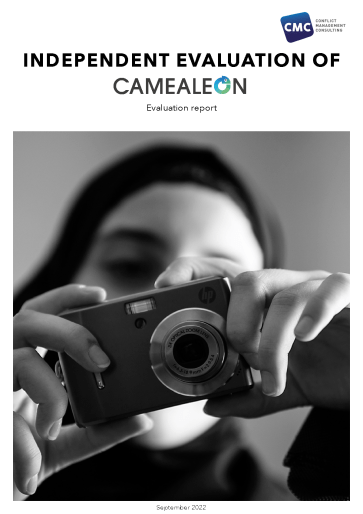
Independent evaluation of CAMEALEON
Report
CAMEALEON is an independent initiative to provide monitoring, evaluation, accountability and learning support to the World Food Programme (WFP)’s multi-purpose cash (MPC) programme for Syrian refugees in Lebanon. Established in 2017, CAMEALEON’s main purpose is to bridge evidence gaps, strengthen...
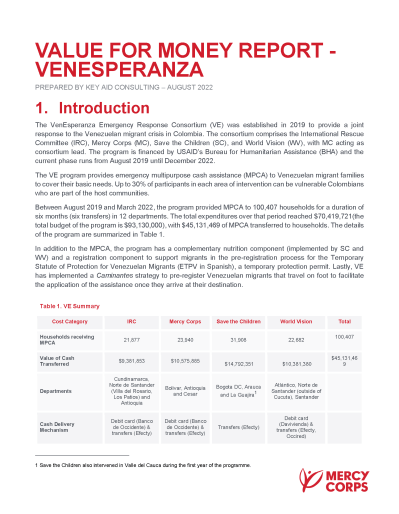
Value for Money Analysis of VenEsperanza
Case Study
The VenEsperanza consortium in Colombia participated in a Value for Money analysis that evaluated financial transactions during the first years of operation of the consortium. The analysis focuses on efficiency, effectiveness and equity of the work of the consortium.

The Changing Landscape of Cash Preparedness: Lists, Risks and Relationships
Report
What are feasible lead times to deliver CVA to recipients in the Horn of Africa? What are the barriers and enablers to ensuring a timely and high quality humanitarian response? What does it take for organizations to be effectively prepared?

Staying together: vulnerable households in Cambodia recover from the socio-economic impacts of COVID-19 and protect their children
Video
A short video highlighting how cash and voucher assistance (CVA) transitioned to livelihood early recovery assistance to achieve child protection outcomes for vulnerable households affected by the secondary impacts of COVID-19 in Cambodia and already receiving case management by child protection agencies.

Delivering Better Together: Standard Operating Procedures for Oxfam’s Approach to Cash and Voucher Assistance
Guidelines and Tools
Delivering Better Together: SOPs for Oxfam’s Approach to Cash and Voucher Assistance is a digital guide to all things cash and vouchers in Oxfam that can be downloaded to and accessed from a phone, tablet, or any other device. The SOPs focus on the basics of cash and vouchers, the use of it for...
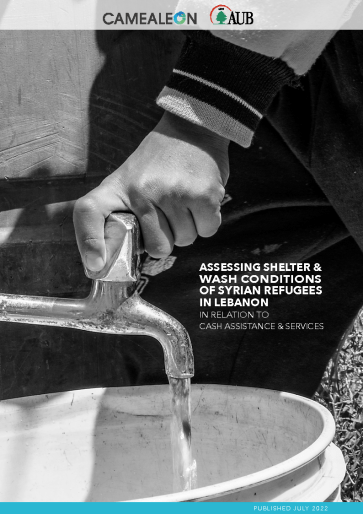
Assessing Shelter and WASH conditions of Syrian Refugees in Lebanon in Relation to Cash Assistance and Services
Case Study
This second study has the two-fold objectives of producing a granular map of WASH and shelter conditions of Syrian refugees in Lebanon, as well as investigating the factors that are associated with improved WASH and shelter outcomes for refugees. More concretely, the research aims to examine the...
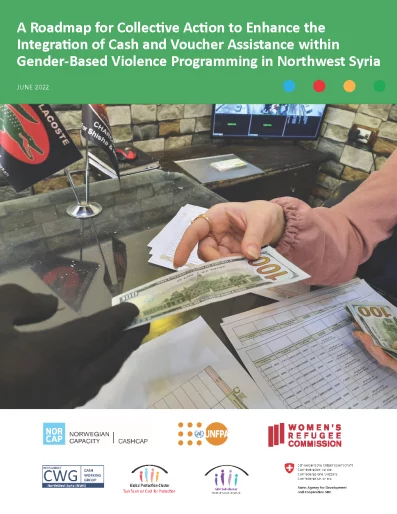
A roadmap for collective action to enhance the integration of cash and voucher assistance within gender-based violence programming in Northwest Syria
Case Study
This case study highlights the practical importance of coordination between CVA and GBV actors at all levels and shows how working in silos is detrimental to assisting to the fullest extent possible women and girls affected by GBV. It documents the conditions that led to the creation of a joint taskforce...

Geotargeting Analysis for Seasonal Assistance: Case study Chad
Case Study
This paper describes the methodology that was developed to address targeting gaps using remote sensing data, presents the results obtained using the methodology, and discusses the challenges in its utilisation.

MPCA Referral Mechanism to Sectoral Services in Iraq
Guidelines and Tools
This is a harmonised and inter-agency mechanism that allows referring MPCA beneficiaries to 5 critical sectors and its activities: Agriculture, Livelihoods, Health, Protection and Shelter. The aim is to provide more holistic support and enhance the impact of MPCA to vulnerable population.
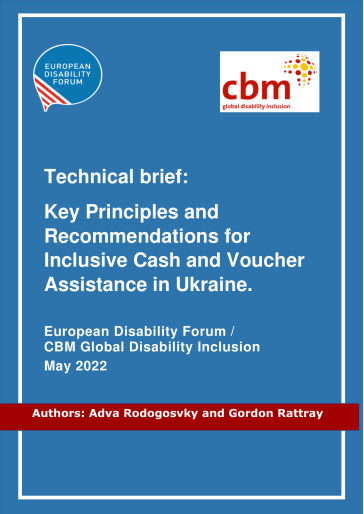
Technical brief: Key Principles and Recommendations for Inclusive Cash and Voucher Assistance in Ukraine.
Guidelines and Tools
A technical brief on inclusive cash and voucher assistance in Ukraine, developed together with the European Disability Forum. The brief is intended to provide general guidance for humanitarian agencies operating in Ukraine on how to implement Disability Inclusive CVA.




